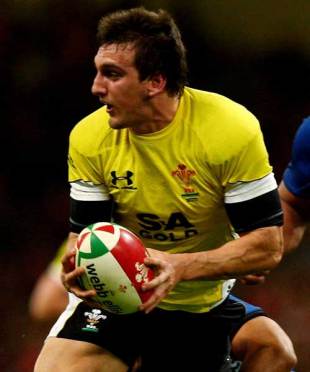|
Welsh Rugby
Warburton's arrival boosts Wales
Huw Richards
November 17, 2009

Sam Warburton impressed in his first start for Wales last Friday
© Getty Images
Enlarge
Drive southwards from the M40 towards England's former training quarters and before long you encounter a sign telling you that it is five miles to the M4. A couple of miles further and there is another sign, also informing you that it is five miles to the M4. Martyn Williams' international career increasingly resembles that road - it progresses steadily, but seems to get no closer to its end. When Warren Gatland became Wales coach and successfully persuaded Williams, who had announced his retirement following the 2007 World Cup, to return to the squad he said that he hoped to get "another 18 months or so" out of the Blues openside. By then he hoped that rising alternatives like Ben Lewis of the Ospreys would have progressed sufficiently to take the No.7 shirt. Two years on, and he remains an automatic choice. And little would make Gatland happier than a guarantee that he'll get two more years, allowing Williams to take his leave of international rugby following what - it can only be hoped - is a more successful World Cup than the miserable 2007 campaign with its conclusion in the 'Ejection of Nantes'. He'll be nearly 36 by then, but so long as he maintains his current level of performance, no problem. If you are good enough, you are young enough. Long careers also, by their nature, create problems for coaches. How can you develop a successor, when the incumbent is apparently immortal? At least nowadays longer international calendars and the use of tactical replacements allow the deputies and would-be heirs the caps and experience that were denied to the Welsh scrum-halves who spent their best years patiently waiting for Gareth Edwards to get injured and the English hookers denied by the consecutive durability of John Pullin and Peter Wheeler. Succession planning is peculiarly difficult in sport - wont to be derailed by injuries, loss of form and poor results. If one reason for Williams' unchallenged position as Wales's first choice openside has been his own consistent brilliance, another has been the injuries that have hampered Lewis's progress. It is fine to have a 34 year old flanker, provided there is a natural alternative or successor. Without that, it becomes a worry. The sighting of a solution was one of a number of reasons why Wales's disappointing display against Samoa earned nothing like the odium heaped on England for their performance against Argentina. There are other factors - there is a difference between not very good and plain lousy and the Welsh public, unlike their English counterparts, are pretty confident that the people in charge of the national team know what they are doing. The big plus, though, was that the better performers against Samoa were youngsters - the players it is reasonable to hope will go not only to the 2011 but the 2015 and maybe 2019 World Cups. James Hook is mastering yet another international position, Leigh Halfpenny - not yet 21- showed the form that made him a Lion and Alun-Wyn Jones, still only just 24, continued his trek towards world class. The interception pass thrown by Dan Biggar should not be allowed to obscure the creativity and composure in evidence during the first-half - his performance was far from the 'nightmare' proclaimed by one over-excited scribe. Most encouraging of the lot was the display of Sam Warburton, making his home debut after receiving his first cap during the summer. He arrived anything but unannounced, having been talked about since he first started winning caps at age group levels. Blues coach David Young enthuses about his gifts and qualities. The early steps in international rugby are, though, demanding and telling before anything that has gone before. We saw a player who has the talent, athleticism and rugby instincts essential to excel at seven - with an innate sense of what line to run and the speed to ensure that their arrival in support advances rather than slows the attack. He did his job in defence and at the breakdown and afterwards was self-critical enough to blame himself for the handling errors that stopped a decent home debut becoming truly memorable. In the greasy conditions produced by the shutting of the roof, such errors are always likely - the important thing is that he was almost invariably in the right place, making things happen in the same way that Williams does. Of course he is not the finished article - but nobody is a few weeks after their 21st birthday. Williams may be the master now, but he had to serve a long and frustrating international apprenticeship, knocked down the pecking order when Graham Henry recruited the later-found-to-be-ineligible Brett Sinkinson to play at No.7. There's little doubt Williams, if fit, will start this season's Six Nations. You'd bet on him still to be there in 2011. Now, though, there is a challenger, an alternative and a natural successor. On Friday night we saw a piece of the future, and it seems to work. © Scrum.com
|
Live Sports
Communication error please reload the page.
-
Football
-
Cricket
-
Rugby
-
- Days
- Hrs
- Mins
- Secs
F1 - Abu Dhabi GP
Abu Dhabi Grand Prix December 11-131. Max Verstappen ()
2. Valtteri Bottas (Mercedes)
3. Lewis Hamilton (Mercedes)
4. Alexander Albon ()
5. Lando Norris ()
6. Carlos Sainz Jr ()
-
ESPNOtherLive >>
Snooker - China Open
Tennis - Miami Open

